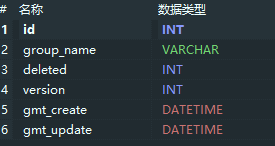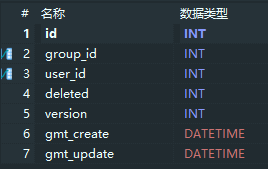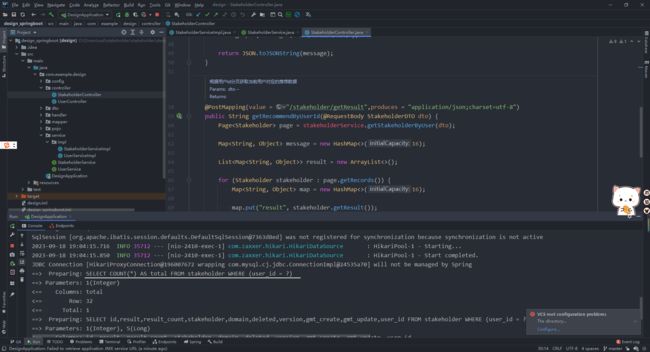在使用SpringBoot时遇到的异常总结(持续更新...)
文章目录
- 异常
-
- MyBatis
-
- java.sql.SQLIntegrityConstraintViolationException: Cannot add or update a child row: a foreign key constraint fails
- Mybatis-Plus查询语句无故自动加条件
- Mybatis No enum constant org.apache.ibatis.type.JdbcType.TEXT
- 参考文献
因为平时在写SpringBoot项目时,总是会遇到各种各样的异常,因此在这里记录一下,以便以后再遇到相同的错误时能够有一个参考
异常
MyBatis
java.sql.SQLIntegrityConstraintViolationException: Cannot add or update a child row: a foreign key constraint fails
时间:2023年09月18日
这个错误实际上并不是coding的问题,而是在向数据库中添加数据时出现的问题,更准确地说是外键约束的问题
可以看到member表中的字段group_id是一个外键(不考虑user_id这一字段)
但是我在向数据库member表中插入数据时,插入的内容是:
![]()
可以发现,向member表插入的数据中groupId=0,但是在squad表中并不存在id=0,所以出现上述异常
还有一个地方:为什么表的名字是squad而不是group/groups,因为group/groups都是mysql的关键字,具体请参考这篇文章:记录使用mybatis-plus时遇到的错误
Mybatis-Plus查询语句无故自动加条件
2023年09月18日
SELECT COUNT(*) AS total FROM stakeholder WHERE deleted = 0 AND (user id = ?)
但是,这次遇到的问题是出现了错误的查询语句,导致没有办法进行正常的查询:

出现了错误的查询语句:
SELECT COUNT(*) AS total FROM stakeholder WHERE user_id = 0 AND (user_id = ?)
之所以会出现这样的问题,有两个方面的原因(因为我自己遇到了这两个方面的错误):
- 因为在
DAO实体类中某一个成员属性是这样定义的:private int userId;,问题就在这里,int 类型的默认值为0,此处应该采用 Integer ,封装类,Integer的默认值为 null ,改为Integer后QueryMapper要搜索的其值就不是0了而是null,即对当前数据库中的表进行全查,而不是查0 - 因为我用到了逻辑删除,我自己将逻辑删除的注解
@TableLogic放到了private Integer userId,导致出现了这样的问题
Mybatis No enum constant org.apache.ibatis.type.JdbcType.TEXT
2023年9月22日
当时我在mybatis的xml配置文件中,将jdbcType设置为和数据库保持一致的text类型,结果抛出了上述异常,JDBCType这个枚举类中不存在Text这个类型,那么我们需要查看一下JDBCType的源码:
public enum JDBCType implements SQLType {
/**
* Identifies the generic SQL type {@code BIT}.
*/
BIT(Types.BIT),
/**
* Identifies the generic SQL type {@code TINYINT}.
*/
TINYINT(Types.TINYINT),
/**
* Identifies the generic SQL type {@code SMALLINT}.
*/
SMALLINT(Types.SMALLINT),
/**
* Identifies the generic SQL type {@code INTEGER}.
*/
INTEGER(Types.INTEGER),
/**
* Identifies the generic SQL type {@code BIGINT}.
*/
BIGINT(Types.BIGINT),
/**
* Identifies the generic SQL type {@code FLOAT}.
*/
FLOAT(Types.FLOAT),
/**
* Identifies the generic SQL type {@code REAL}.
*/
REAL(Types.REAL),
/**
* Identifies the generic SQL type {@code DOUBLE}.
*/
DOUBLE(Types.DOUBLE),
/**
* Identifies the generic SQL type {@code NUMERIC}.
*/
NUMERIC(Types.NUMERIC),
/**
* Identifies the generic SQL type {@code DECIMAL}.
*/
DECIMAL(Types.DECIMAL),
/**
* Identifies the generic SQL type {@code CHAR}.
*/
CHAR(Types.CHAR),
/**
* Identifies the generic SQL type {@code VARCHAR}.
*/
VARCHAR(Types.VARCHAR),
/**
* Identifies the generic SQL type {@code LONGVARCHAR}.
*/
LONGVARCHAR(Types.LONGVARCHAR),
/**
* Identifies the generic SQL type {@code DATE}.
*/
DATE(Types.DATE),
/**
* Identifies the generic SQL type {@code TIME}.
*/
TIME(Types.TIME),
/**
* Identifies the generic SQL type {@code TIMESTAMP}.
*/
TIMESTAMP(Types.TIMESTAMP),
/**
* Identifies the generic SQL type {@code BINARY}.
*/
BINARY(Types.BINARY),
/**
* Identifies the generic SQL type {@code VARBINARY}.
*/
VARBINARY(Types.VARBINARY),
/**
* Identifies the generic SQL type {@code LONGVARBINARY}.
*/
LONGVARBINARY(Types.LONGVARBINARY),
/**
* Identifies the generic SQL value {@code NULL}.
*/
NULL(Types.NULL),
/**
* Indicates that the SQL type
* is database-specific and gets mapped to a Java object that can be
* accessed via the methods getObject and setObject.
*/
OTHER(Types.OTHER),
/**
* Indicates that the SQL type
* is database-specific and gets mapped to a Java object that can be
* accessed via the methods getObject and setObject.
*/
JAVA_OBJECT(Types.JAVA_OBJECT),
/**
* Identifies the generic SQL type {@code DISTINCT}.
*/
DISTINCT(Types.DISTINCT),
/**
* Identifies the generic SQL type {@code STRUCT}.
*/
STRUCT(Types.STRUCT),
/**
* Identifies the generic SQL type {@code ARRAY}.
*/
ARRAY(Types.ARRAY),
/**
* Identifies the generic SQL type {@code BLOB}.
*/
BLOB(Types.BLOB),
/**
* Identifies the generic SQL type {@code CLOB}.
*/
CLOB(Types.CLOB),
/**
* Identifies the generic SQL type {@code REF}.
*/
REF(Types.REF),
/**
* Identifies the generic SQL type {@code DATALINK}.
*/
DATALINK(Types.DATALINK),
/**
* Identifies the generic SQL type {@code BOOLEAN}.
*/
BOOLEAN(Types.BOOLEAN),
/* JDBC 4.0 Types */
/**
* Identifies the SQL type {@code ROWID}.
*/
ROWID(Types.ROWID),
/**
* Identifies the generic SQL type {@code NCHAR}.
*/
NCHAR(Types.NCHAR),
/**
* Identifies the generic SQL type {@code NVARCHAR}.
*/
NVARCHAR(Types.NVARCHAR),
/**
* Identifies the generic SQL type {@code LONGNVARCHAR}.
*/
LONGNVARCHAR(Types.LONGNVARCHAR),
/**
* Identifies the generic SQL type {@code NCLOB}.
*/
NCLOB(Types.NCLOB),
/**
* Identifies the generic SQL type {@code SQLXML}.
*/
SQLXML(Types.SQLXML),
/* JDBC 4.2 Types */
/**
* Identifies the generic SQL type {@code REF_CURSOR}.
*/
REF_CURSOR(Types.REF_CURSOR),
/**
* Identifies the generic SQL type {@code TIME_WITH_TIMEZONE}.
*/
TIME_WITH_TIMEZONE(Types.TIME_WITH_TIMEZONE),
/**
* Identifies the generic SQL type {@code TIMESTAMP_WITH_TIMEZONE}.
*/
TIMESTAMP_WITH_TIMEZONE(Types.TIMESTAMP_WITH_TIMEZONE);
/**
* The Integer value for the JDBCType. It maps to a value in
* {@code Types.java}
*/
private Integer type;
/**
* Constructor to specify the data type value from {@code Types) for
* this data type.
* @param type The value from {@code Types) for this data type
*/
JDBCType(final Integer type) {
this.type = type;
}
/**
*{@inheritDoc }
* @return The name of this {@code SQLType}.
*/
public String getName() {
return name();
}
/**
* Returns the name of the vendor that supports this data type.
* @return The name of the vendor for this data type which is
* {@literal java.sql} for JDBCType.
*/
public String getVendor() {
return "java.sql";
}
/**
* Returns the vendor specific type number for the data type.
* @return An Integer representing the data type. For {@code JDBCType},
* the value will be the same value as in {@code Types} for the data type.
*/
public Integer getVendorTypeNumber() {
return type;
}
/**
* Returns the {@code JDBCType} that corresponds to the specified
* {@code Types} value
* @param type {@code Types} value
* @return The {@code JDBCType} constant
* @throws IllegalArgumentException if this enum type has no constant with
* the specified {@code Types} value
* @see Types
*/
public static JDBCType valueOf(int type) {
for( JDBCType sqlType : JDBCType.class.getEnumConstants()) {
if(type == sqlType.type)
return sqlType;
}
throw new IllegalArgumentException("Type:" + type + " is not a valid "
+ "Types.java value.");
}
}
因此我们需要在\中将jdbcType设置为VARCHAR与数据库中Text类型数据进行映射
参考文献
1、MyBatis添加数据报错Cannot add or update a child row: a foreign key constraint fails
2、Mybatis-Plus查询语句无故自动加条件




